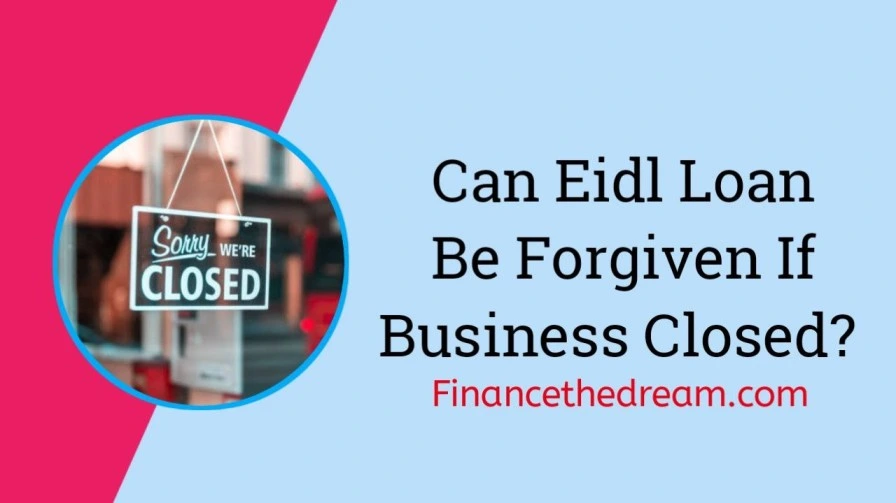The U.S. Small Business Administration (SBA) created the Economic Injury Disaster Loan (EIDL) program to assist nonprofit organizations and businesses recover from the financial effects of natural disasters, such as the COVID-19 epidemic. For qualified companies, the EIDL offers low-interest loans that give them the money to pay for operating costs in hard times. The EIDL does, however, have some restrictions and limitations, especially about forgiveness, just like most loans.

Can an EIDL loan be forgiven in the Event that a business closes? In a nutshell, it depends on the closure’s conditions, and there are a few things to consider.
- 1 1. What Does EIDL Loan Forgiveness Mean?
- 2 2. What Takes Place if a Company Closes Before the Loan Is Repaid?
- 3 3. Is It Possible to Request Forgiveness If Your Company Closes?
- 4 4. What Options Do You Have? What Happens If Your Company Closes and You Can Pay Back the EIDL Loan?
- 5 5. Conclusion: Essential Information
1. What Does EIDL Loan Forgiveness Mean?
EIDL loans are primarily intended to be loans and typically do not offer forgiveness alternatives, in contrast to the Pay Cheque Protection Program (PPP) loans created with forgiveness in mind. However, under some circumstances, especially during the COVID-19 epidemic, the SBA offered to erase some of the EIDL debts partially. The EIDL Advance, a grant component that was not repaid, and the forgiveness component usually covered certain deferment choices.
Since there is no automatic forgiveness mechanism for regular EIDL loans, firms are often expected to repay the loan by the terms that were agreed upon. However, there are opportunities for payment postponement, and the loan can be paid off early without penalty.
2. What Takes Place if a Company Closes Before the Loan Is Repaid?
If you have an outstanding EIDL loan and your business closes, the loan does not just go away. This is the usual course of events: Loan Repayment.
Even if the company is shut down, the SBA will still demand that the EIDL loan be repaid. Unless the loan is specifically forgiven—which, as was previously indicated, is not typical with EIDL loans—this is the case. However, the precise conditions of your loan may vary based on when it was obtained and whether any exceptional circumstances exist.
Collateral Business assets may be needed as collateral for EIDL loans over $25,000. The loan may be repaid using the proceeds from the sale of assets in the Event that the company closes and its assets are liquidated.
Individual Promises
Business owners who obtain EIDL loans frequently face personal payback obligations if their company cannot pay. This implies that, depending on the conditions of the loan arrangement, the SBA may try to collect the remaining amount from the business owner’s assets if the business fails and the assets are inadequate to cover the loan.
3. Is It Possible to Request Forgiveness If Your Company Closes?
Generally speaking, EIDL loans cannot be repaid just because a business closes. The exact SBA policies in effect when the loan was issued determine who is eligible for forgiveness.
For instance:
• EIDL Advance (Grant Portion) Forgiveness: If your company was awarded an EIDL Advance (also called a grant) during the COVID-19 epidemic, the advance portion of the loan may be forgiven as long as you fulfilled the requirements (such as allocating the money for suitable business expenses).
• General EIDL Loan Forgiveness: Businesses were often expected to repay the loan unless certain disaster-related conditions transpired, and there was no established broad forgiveness mechanism for the actual EIDL loan (not the advance).
Although you will probably have to return the EIDL loan if your company folds, it would be worthwhile to contact the SBA to find any possible repayment plans, deferments, or restructuring opportunities, especially if you are experiencing extreme financial difficulties.
4. What Options Do You Have? What Happens If Your Company Closes and You Can Pay Back the EIDL Loan?
There are still several things you can do if your company shuts down and you are unable to pay back the EIDL loan:
Request a Loan Deferment or Modification
Depending on the conditions of the loan, the SBA permits EIDL loan installments to be postponed for a maximum of 24 months. You might ask for a postponement or modification if you are having trouble making payments, particularly if uncontrollable circumstances caused the business closure.
Talk about the terms of repayment.
If your business has closed and you can no longer make money, you can work out repayment terms with the SBA. The SBA may cooperate with you to establish a reasonable repayment plan, but forgiveness is improbable.
Asset Liquidation
The money raised from selling your company’s assets could be used to repay the EIDL loan. This can entail merchandise of sale, business equipment, or any real estate that was pledged as security.
Consult a Lawyer
You can better understand your alternatives if your company is experiencing severe financial difficulties by speaking with a financial advisor or lawyer specializing in business lending. They might be able to help you navigate bankruptcy procedures or other legal options that could lower or even completely remove your liability.
5. Conclusion: Essential Information
To put it briefly, a business closing does not usually result in the forgiveness of EIDL loans. Business owners are still in charge of repaying the loan, which may entail selling assets or negotiating new terms, even though the loan provides some flexibility in payment terms, particularly in trying circumstances.
Understanding the conditions of an EIDL loan and looking into all available choices for repayment, including contacting the SBA for modifications or deferments, are crucial for business owners. Resolving the debt, whether by repayment, asset liquidation, or consulting a professional, should be your top priority if your company has closed.
To determine your best course of action going forward, it’s a good idea to discuss your options with the SBA or get legal advice if you are experiencing financial difficulties due to closing your business and having an outstanding EIDL loan.
